 |
|
|
| |
| Delegates met informally for most of the day and
reconvened formally at 5:30 PM to discuss the Co-Chair's document
on possible elements for a draft decision on an enabling environment.
|
|
The
EU meeting to discuss the Co-Chairs documents
|
|
|
The
G-77/China meeting to discuss the Co-Chairs' documents |
|
Possible elements for a draft decision on
international cooperation and an enabling environment
|
|
Co-Chair
Madina Jarbussynova (Kazakhstan) chaired the evening session on
possible elements for a draft decision on an enabling environment
|
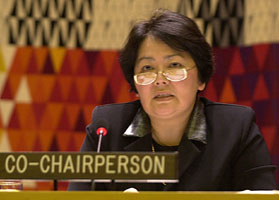 |
|
Delegates
in the ECOSOC chamber
|
|
JoAnne
DiSano, Director, Division for Sustainable Development, Mohammad
Reza Salamat, Iran and Chair of the G-77/China and Alexander De
Barros, Secretariat
|
|
 Iran,
for the G-77/China, making general comments on the Co-Chairs'
Summary on an Enabling Environment, said text should reflect
that , inter alia, private sector flows complement Official
Development Assistance (ODA); and the GEF work could be improved.
He suggested alternative text on eliminating unnecessary duplication
between bilateral and multilateral development institutions. On
agricultural subsidies, he called for a reference to energy taxes
and to the harmful impact of subsidies on the environment. He proposed
additional text stressing that environmental standards should not
become trade barriers.
Iran,
for the G-77/China, making general comments on the Co-Chairs'
Summary on an Enabling Environment, said text should reflect
that , inter alia, private sector flows complement Official
Development Assistance (ODA); and the GEF work could be improved.
He suggested alternative text on eliminating unnecessary duplication
between bilateral and multilateral development institutions. On
agricultural subsidies, he called for a reference to energy taxes
and to the harmful impact of subsidies on the environment. He proposed
additional text stressing that environmental standards should not
become trade barriers.
 Iran, making
general comments on the possible elements for a draft decision,
said too much emphasis was placed on the role of the private sector,
and called for highlighting: the role of poverty eradication; improving
the role of the GEF; removing harmful subsidies; and furthering
efforts to cancel debt burden.
Iran, making
general comments on the possible elements for a draft decision,
said too much emphasis was placed on the role of the private sector,
and called for highlighting: the role of poverty eradication; improving
the role of the GEF; removing harmful subsidies; and furthering
efforts to cancel debt burden.
 Responding to
interventions made by other delegates, Iran,
for the G-77/China, proposed
language from the Millennium Declaration emphasizing the need for
good governance at the national and international levels and transparency
in the areas of finance, trade and monitoring systems.
Responding to
interventions made by other delegates, Iran,
for the G-77/China, proposed
language from the Millennium Declaration emphasizing the need for
good governance at the national and international levels and transparency
in the areas of finance, trade and monitoring systems.
|
 Sweden,
for the EU, making
general comments on the possible elements for a draft decision,
stated that although the EU recognized that international cooperation
is the subject under consideration, it would have preferred a
more balanced approach regarding domestic activities.
Sweden,
for the EU, making
general comments on the possible elements for a draft decision,
stated that although the EU recognized that international cooperation
is the subject under consideration, it would have preferred a
more balanced approach regarding domestic activities.
 Sweden
for the EU makes specific proposals to the section on
general considerations, and suggested text on, inter alia,
the importance of a favorable and enabling domestic environment
based on a sound macro-economic framework and on good governance,
and proposed language stating that "many" developing countries
have not yet seen substantial benefits from globalization.
Sweden
for the EU makes specific proposals to the section on
general considerations, and suggested text on, inter alia,
the importance of a favorable and enabling domestic environment
based on a sound macro-economic framework and on good governance,
and proposed language stating that "many" developing countries
have not yet seen substantial benefits from globalization.
|
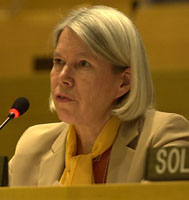 |
|
 Canada
makes general remarks on the draft decision on an enabling environment
and called for more balance with regard to international and domestic
governance issues. She also said CSD-9 could consider Chapter 2
of Agenda 21 in order to offer input on the UN Third Conference
on Least Developed Countries (LDC III) and the Financing for Development
conference on improving the reach and effectiveness of international
cooperation. Regarding specific
comments to the section on general considerations, Canada
supported deleting text on different contributions to global environmental
degradation and proposed CSD-8 text stating that developed countries
should work in partnership with developing countries to help develop,
adopt and implement effective strategies to achieve sustainable
development, consistent with commitments made at UNCED.
Canada
makes general remarks on the draft decision on an enabling environment
and called for more balance with regard to international and domestic
governance issues. She also said CSD-9 could consider Chapter 2
of Agenda 21 in order to offer input on the UN Third Conference
on Least Developed Countries (LDC III) and the Financing for Development
conference on improving the reach and effectiveness of international
cooperation. Regarding specific
comments to the section on general considerations, Canada
supported deleting text on different contributions to global environmental
degradation and proposed CSD-8 text stating that developed countries
should work in partnership with developing countries to help develop,
adopt and implement effective strategies to achieve sustainable
development, consistent with commitments made at UNCED.
|
|
|
 Nigeria,
making
general comments on the Summary of the discussion, said globalization
was not accurately visualized in the summary. He said the inequity
of trade benefits must be better reflected and called for language
on and commitment to implementation.
Nigeria,
making
general comments on the Summary of the discussion, said globalization
was not accurately visualized in the summary. He said the inequity
of trade benefits must be better reflected and called for language
on and commitment to implementation.
 On general consideration,
Nigeria
said if good governance at the national level is discussed then
good governance of multilateral organizations must be discussed,
and highlighted differences between developing countries and countries
with economies in transition.
On general consideration,
Nigeria
said if good governance at the national level is discussed then
good governance of multilateral organizations must be discussed,
and highlighted differences between developing countries and countries
with economies in transition.
|
 Australia,
making general comments on the document on possible elements,
called for a better balance between the impact of ODA with private
resource flows, and on general
considerations, Australia proposed language on: globalization
having the potential to deliver positive and sustainable benefits
to all countries, with awareness of the emerging inequity in the
realization of those benefits; and reaffirming that economic growth
and increased trading opportunities provided by trade liberalization
are essential for an enabling environment.
Australia,
making general comments on the document on possible elements,
called for a better balance between the impact of ODA with private
resource flows, and on general
considerations, Australia proposed language on: globalization
having the potential to deliver positive and sustainable benefits
to all countries, with awareness of the emerging inequity in the
realization of those benefits; and reaffirming that economic growth
and increased trading opportunities provided by trade liberalization
are essential for an enabling environment.
|
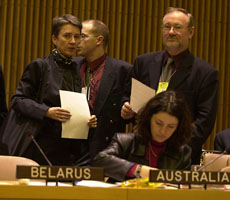 |
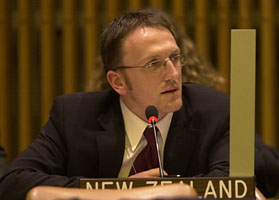 |
 New
Zealand,
making specific comments on general considerations, suggested text
stating that the Commission could: stress the need for good governance
within each country and at the international level; and reiterate
that an open, rule-based, equitable, secure, non-discriminatory, transparent
and predictable multilateral trade system is an essential element
of an enabling environment.
New
Zealand,
making specific comments on general considerations, suggested text
stating that the Commission could: stress the need for good governance
within each country and at the international level; and reiterate
that an open, rule-based, equitable, secure, non-discriminatory, transparent
and predictable multilateral trade system is an essential element
of an enabling environment. |
 On general
considerations, the
US, proposed text recognizing that an enabling domestic
environment that incorporates, inter alia, the rule of law, good
governance and anti-corruption efforts, is essential for sustainable
development.
On general
considerations, the
US, proposed text recognizing that an enabling domestic
environment that incorporates, inter alia, the rule of law, good
governance and anti-corruption efforts, is essential for sustainable
development.
On international
cooperation, the US reiterated the US had not committed
to the ODA target of .7% and proposed language to reflect that
some countries had not made this commitment.
|
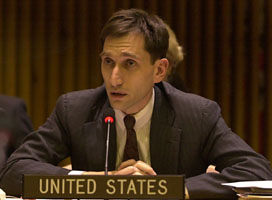 |
|
|
 Japan
making
general comments on the elements for a draft decision document. To
balance the text, Canada, Australia, the US, Norway and Japan highlighted
different aspects, including on: domestic and international governance
issues; private sector resource and trade flows, private investments
and foreign direct investment (FDI); and trade benefits.
Japan
making
general comments on the elements for a draft decision document. To
balance the text, Canada, Australia, the US, Norway and Japan highlighted
different aspects, including on: domestic and international governance
issues; private sector resource and trade flows, private investments
and foreign direct investment (FDI); and trade benefits. |
|
|
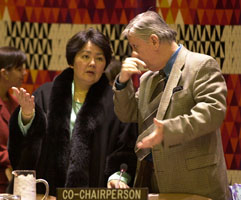
|
CO-Chair
Madina Jarbussynova (Kazakhstan) and Alexandar De Barros (Secretariat) |
| The Access Initiative: An Initiative
to Promote Access to Information, Participation and Justice in Environmental
Decisionmaking |
 The
Access Initiative seeks to promote access to information, participation
and justice in environmental decision-making--three principles
endorsed by governments in Principle 10 of the Rio Declaration.
A partnership led by World Resources Institute (WRI), based in
the US, Environmental Management and Law Association (EMLA), based
in Hungary, and Corporacion Participa, based in Chile, is developing
and pilot-testing a set of indicators for use by public interest
groups to track their countries' progress over time in implementing
the principles. The indicators are designed to assess the system
of public access to environmental decision-making. Country-level
pilot texts will seek to ask the following questions: Does the
national-level policy framework guarantee "access" rights;
is public information available The
Access Initiative seeks to promote access to information, participation
and justice in environmental decision-making--three principles
endorsed by governments in Principle 10 of the Rio Declaration.
A partnership led by World Resources Institute (WRI), based in
the US, Environmental Management and Law Association (EMLA), based
in Hungary, and Corporacion Participa, based in Chile, is developing
and pilot-testing a set of indicators for use by public interest
groups to track their countries' progress over time in implementing
the principles. The indicators are designed to assess the system
of public access to environmental decision-making. Country-level
pilot texts will seek to ask the following questions: Does the
national-level policy framework guarantee "access" rights;
is public information available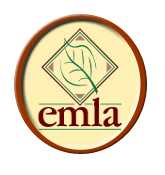 regarding pollution that affects the health of large groups of
people; Does the public have access to information about the environmental
performance of industrial facilities; Are decisions on policies
or specific projects supported by mechanisms for meaningful public
participation; Does the government invest in building public capacity
to utilize access to environmental decision-making; and Are there
mechanisms for redress and conflict resolution for failure to
inform and involve the public in environmental decision-making?
regarding pollution that affects the health of large groups of
people; Does the public have access to information about the environmental
performance of industrial facilities; Are decisions on policies
or specific projects supported by mechanisms for meaningful public
participation; Does the government invest in building public capacity
to utilize access to environmental decision-making; and Are there
mechanisms for redress and conflict resolution for failure to
inform and involve the public in environmental decision-making?
The following
Indicators Categories were identified: General Framework Guaranteeing
Access Rights; Information about the Environment and Pollution
with High Health Impacts; Access to Environmental Impact Assessment;
Access to Facility-level Environmental Management; Access to Concessions
and Public Procurement Agreements; Access to Plans, Policies and
Programs; and Capacity.
 The
Access Initiative will pilot text the indicators in up to ten
countries: Latin America (Chile, Mexico and Bolivia); North America
(US); Europe (Hungary and possibly Russia and Kazakhstan); Africa
(Uganda and South Africa); and Asia (Thailand and India) The
Access Initiative will pilot text the indicators in up to ten
countries: Latin America (Chile, Mexico and Bolivia); North America
(US); Europe (Hungary and possibly Russia and Kazakhstan); Africa
(Uganda and South Africa); and Asia (Thailand and India)
To learn
more about the Access Initiative, please visit www.wri.org/governance/accessinit.html
Or contact
the Access Initiative Team Members directly:
Marjorie
Greene, www.wri.org,
mgreene@wri.org
Judy Amorosa,
www.emla.hu, judy@emla.org
Maria Eugenia
Brockmann, www.participa.cl,
mebrockmann@participa.cl
|
|
RELATED
LINKS
Past
IISD Coverage:
|
|


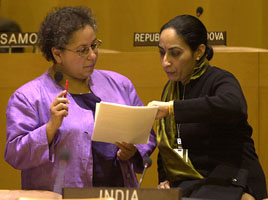

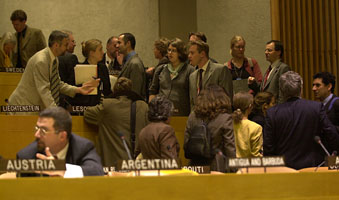
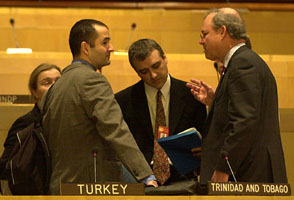
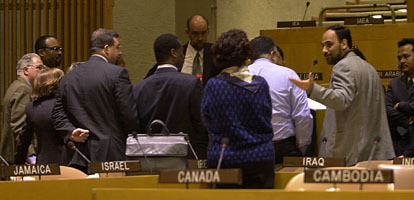

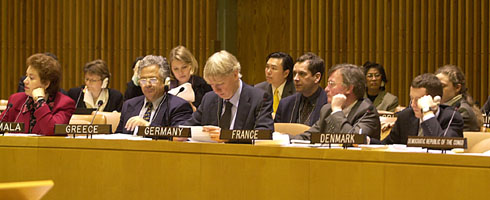



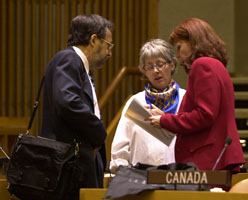
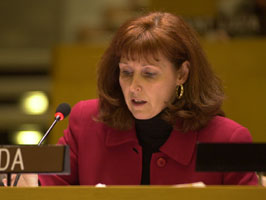
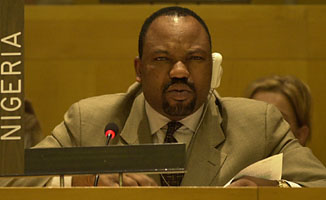



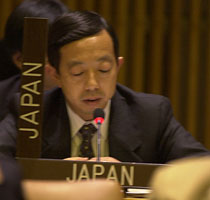
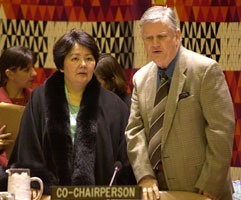

 The
Access Initiative seeks to promote access to information, participation
and justice in environmental decision-making--three principles
endorsed by governments in Principle 10 of the Rio Declaration.
A partnership led by World Resources Institute (WRI), based in
the US, Environmental Management and Law Association (EMLA), based
in Hungary, and Corporacion Participa, based in Chile, is developing
and pilot-testing a set of indicators for use by public interest
groups to track their countries' progress over time in implementing
the principles. The indicators are designed to assess the system
of public access to environmental decision-making. Country-level
pilot texts will seek to ask the following questions: Does the
national-level policy framework guarantee "access" rights;
is public information available
The
Access Initiative seeks to promote access to information, participation
and justice in environmental decision-making--three principles
endorsed by governments in Principle 10 of the Rio Declaration.
A partnership led by World Resources Institute (WRI), based in
the US, Environmental Management and Law Association (EMLA), based
in Hungary, and Corporacion Participa, based in Chile, is developing
and pilot-testing a set of indicators for use by public interest
groups to track their countries' progress over time in implementing
the principles. The indicators are designed to assess the system
of public access to environmental decision-making. Country-level
pilot texts will seek to ask the following questions: Does the
national-level policy framework guarantee "access" rights;
is public information available regarding pollution that affects the health of large groups of
people; Does the public have access to information about the environmental
performance of industrial facilities; Are decisions on policies
or specific projects supported by mechanisms for meaningful public
participation; Does the government invest in building public capacity
to utilize access to environmental decision-making; and Are there
mechanisms for redress and conflict resolution for failure to
inform and involve the public in environmental decision-making?
regarding pollution that affects the health of large groups of
people; Does the public have access to information about the environmental
performance of industrial facilities; Are decisions on policies
or specific projects supported by mechanisms for meaningful public
participation; Does the government invest in building public capacity
to utilize access to environmental decision-making; and Are there
mechanisms for redress and conflict resolution for failure to
inform and involve the public in environmental decision-making? The
Access Initiative will pilot text the indicators in up to ten
countries: Latin America (Chile, Mexico and Bolivia); North America
(US); Europe (Hungary and possibly Russia and Kazakhstan); Africa
(Uganda and South Africa); and Asia (Thailand and India)
The
Access Initiative will pilot text the indicators in up to ten
countries: Latin America (Chile, Mexico and Bolivia); North America
(US); Europe (Hungary and possibly Russia and Kazakhstan); Africa
(Uganda and South Africa); and Asia (Thailand and India)